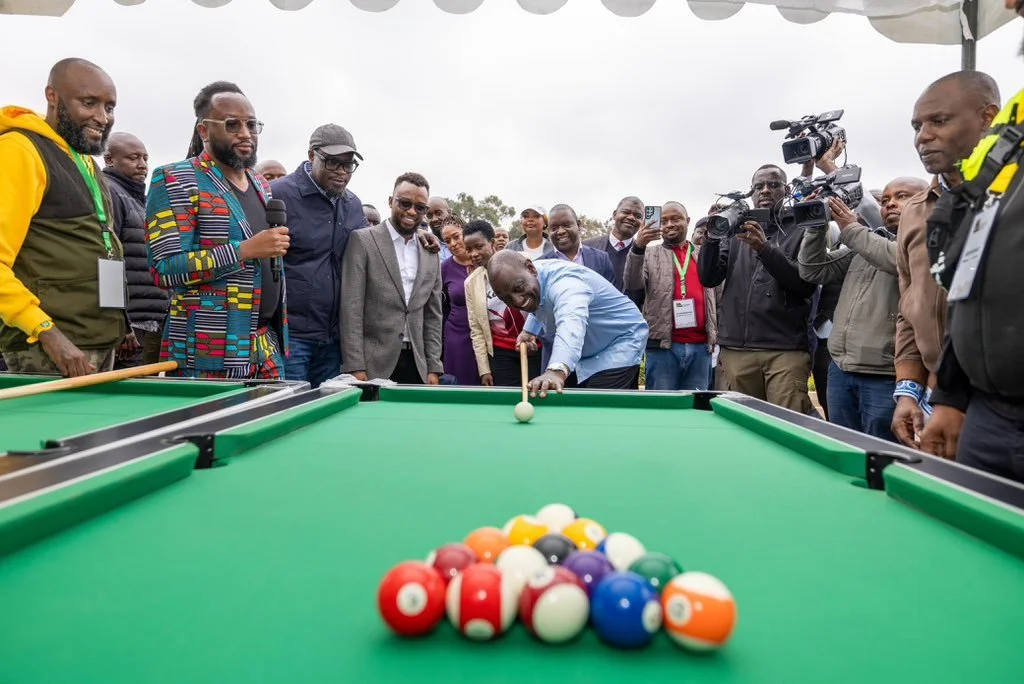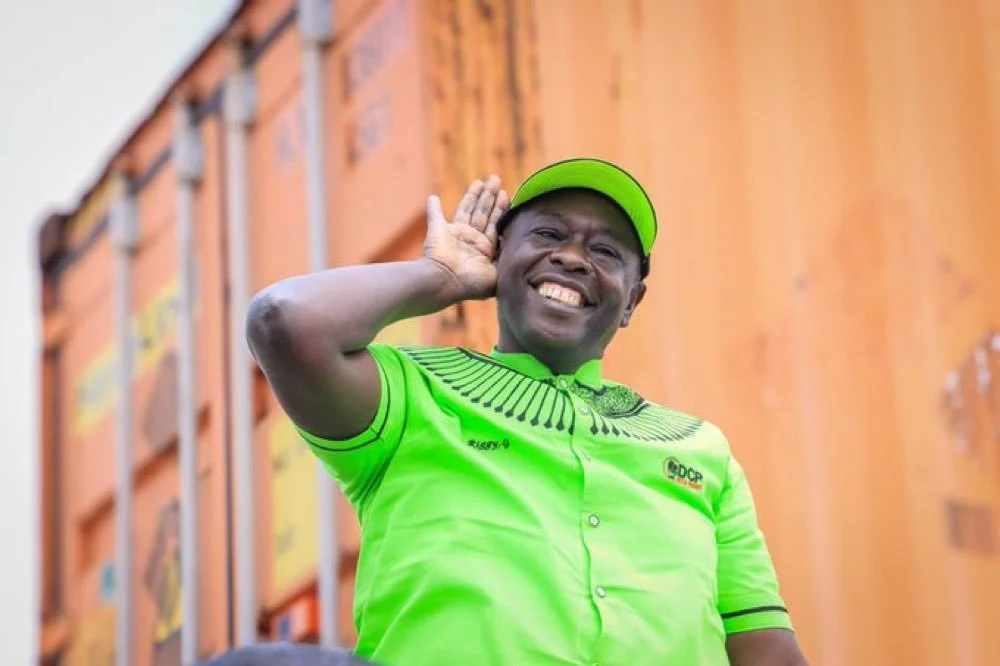Toxic Lyrikali State House Cypher: The 3 Points Perspective
Mchezo wa Taon, Nairobi, Kenya
The rate at which the images spread across social media implied a literal digital wildfire. Thousands of Nairobi youth, majorly lobbied from Eastlands, inside the Statehouse, eating rice in the spirit of economic empowerment. One sad fact is, there are a number of those who ate rice at Statehouse who have not afforded another meal since that one, 24 hours later.
Among the regime sympathisers, Toxic Lyrikali, an artist whose lyrics are a soundtrack to the struggles of Nairobi streets, was flanked by the popular Buruklyn Boyz and Dyana Cods, smiling inside the manicured grounds of State House. The visit, a public show of support for President William Ruto's government, was not just a photo op; it was a cultural flashpoint, igniting a fierce debate that lays bare the very tricky intersection of art, politics, and public perception in modern Kenya.
Statehouse Kenya is being run by comedians like Chipukeezy and drama festival instructors like Itumbi, I did not expect the circus to be well coordinated. It has become the playground of PR gimmicks that shame the very office that is the presidency, but who is surprised, really? Everyone in that government is intellectually impaired.
The event, and the meltdown reaction to it, can be best understood by dissecting the three distinct, clashing perspectives at the heart of this drama: the ambitious artist, the betrayed fan, and the calculating politician. In this article, I will struggle to explain why everyone thinks their opinion should make the most sense.
The Artist: A Seat at the High Table
For most artists, summons to the House on the hill might be an ultimate validation, highly depending on your political stand regarding the government of the day. It symbolises a journey from the margins to the very centre of national power, your voice being USED by the upper echelons of power. For artists like Toxic Lyrikali, whose brand is forged in the "ghetto", this invitation signifies more than just recognition, it represents opportunity. It's the promise of transcending the daily hustle, of accessing resources, and of securing a bag that the streets can barely guarantee.
I have met the man, worked with him even, in the audio and video production of KejaYaCapo’s “DENGE DINGO”. Not to say I know him closely, but I know for damn sure he needs the money like the rest of us. Like every artist, he has invested in his craft, his time and his talents; getting his dues is his number one priority.
From his and the team's viewpoint, the visit is not a betrayal but a strategic move. An attempt to leverage his cultural influence capital for tangible gain, and not just for self, but potentially for the community they represent. The argument, often made in private, is, "How can we change the system if we are not in the room where decisions are made?" To them, this is not selling out; it is buying in. It’s an attempt to trade street credibility for a seat at the table, hoping to influence policy (nobody really cares what he thinks about governance and policy, if he thinks at all) or, at the very least, secure the bag. In a nation where artistic careers are precarious, the stability offered by political patronage can be an irresistible siren song.
It is also vital to remember that we are in a dictatorship, when they send state agents to “invite” you to the statehouse, it is not a matter of choice. The presidential henchmen view it as an anointing, a favour they are doing for you; a decline would be met with obvious gruesome responses. From the artist’s & his team’s perspective, this was a chance they couldn’t pass on. I mean, get paid for eating rice at Statehouse and say TUTAM? Who in their right mind would say no to such a goddamn life-changing opportunity?
The Fan: A Symphony of Betrayal
The public backlash, however, tells a different story. The only way Toxic can outmanoeuvre this is if the love his fans have for him is greater than the hate they hold for William Ruto; I can argue that the hate is more intense.
For most of his fans, this was not a moment of pride but of profound betrayal. A betrayal and mockery of more than 150* young Kenyans brutally murdered by this regime for advocating for change through peaceful protests between 2024 and 2025. The currency of artists like Toxic Lyrikali is being perceived as the voice of the voiceless, their music a raw, unfiltered critique of the very system that creates the poverty and disenfranchisement they rap about. Their success is built on an understanding with their audience: "We are one of you. We feel your pain."
When these artists openly endorse a government that a significant portion of their fanbase blames for the punitive cost of living, soaring taxes under the controversial Finance Act, and the truths of police brutality, that pact is shattered. Sisi kama mafans, we see it as a laughable contradiction. How can you rap about the struggles of the common mwananchi in the morning and dine with those perceived as the architects of that struggle in the same morning?
For these supporters, the artists have committed the ultimate sin: they have used the voice given to them by the people to legitimise a power structure the Kenyan youth clearly oppose. The reaction on platforms like X (formerly Twitter) and TikTok was swift and brutal with the artists being branded as "sell-outs". Their State House visit was framed as an act of treason against the sufferation they claim to represent. To us, the fans, the artist has become a tool for a "killer regime", a painful reminder that even our heroes have a price, and it’s a bowl of rice.
The Politician: The Art of Perception Capture
From the perspective of the political elite, the strategy is as old as politics itself, but with a modern, sophisticated twist called ‘games of urban areas’ (mchezo wa taon). Co-opting popular cultural figures, especially those from demographics that are young, restless, and typically anti-establishment, is a masterclass in perception management. The Ruto regime don’t need to be liked; they just have to look like they are liked.
They first started with Matwana culture; in all sanity, the son of the president has no interest in upholding a ghetto culture. He is the front to lure the “East Lando” vote; to them we are in a game, and we are NOT among the players.
First, it manufactures consent. By showcasing popular youth artists at State House, the government creates a powerful visual narrative that suggests its popularity with the youth—a critical and volatile demographic.A group of the citizenry that has been brave enough to show displeasure with government and brave enough to protest and picket. It’s a message that says, "See? The cool kids are with us. The voice of the street supports our agenda."
This imagery is designed to create an illusion of widespread support, regardless of the reality on the ground.
Second, it neutralises dissent. The most potent critics are often cultural leaders. By bringing an artist like Toxic Lyrikali into the fold, the establishment effectively silences a potentially powerful dissenting voice. The artist is unlikely to release a track critical of the government while enjoying its patronage. It's a strategic move to turn a potential threat into a PR asset. This is what Shaffie Weru and Chipukeezy assume to be an ego masterstroke, as do the PR think tanks of the regime.
Finally, it’s about capturing culture. The current administration understands that political battles in Kenya are also cultural wars. Aligning itself with the vibrant Sheng-speaking, drill-music-loving subculture of Nairobi's youth, it attempts to absorb its "cool" and organic appeal, making the government appear more relatable and in touch than its policies might suggest. It’s just a PR gimmick.
My 2 Cents
The State House theatrics of Toxic Lyrikali and his cabal of idiots is more than just a fleeting news item. It is a microcosm of the eternal dilemma facing artists in a politically charged country like Kenya. Can one really engage with power without being consumed by it? Is that possible if your voice is always used as a weapon and not as a worthy contribution?
The politician gains a short-term PR victory, and the artist gets an adolescent moment of recognition and perhaps a financial lifeline. But the long-term cost is often borne by the artist, who risks losing the one thing that made them valuable in the first place: their credibility with the people. The fans, left feeling abandoned, will simply look for a new hero, a new voice that speaks their truth, and in the unforgiving streets of Nairobi, authenticity is everything.
However, as a friend pointed out, we can’t separate the art from the artist and he has clearly stated before that he is an obtainer. He says he will make it no matter the choice, I think this is him reliving his lyrics.
The moment organic support is perceived as sold, it is lost forever.
That said, I think tunaongozwa na mwenda wazimu, prioritising hand outs instead of economic policy enforcements to create environment that avoids handouts is nuts. Anyway, Listen to Mwenda Wazimu by Domani Munga and KejaYaCapo here.





